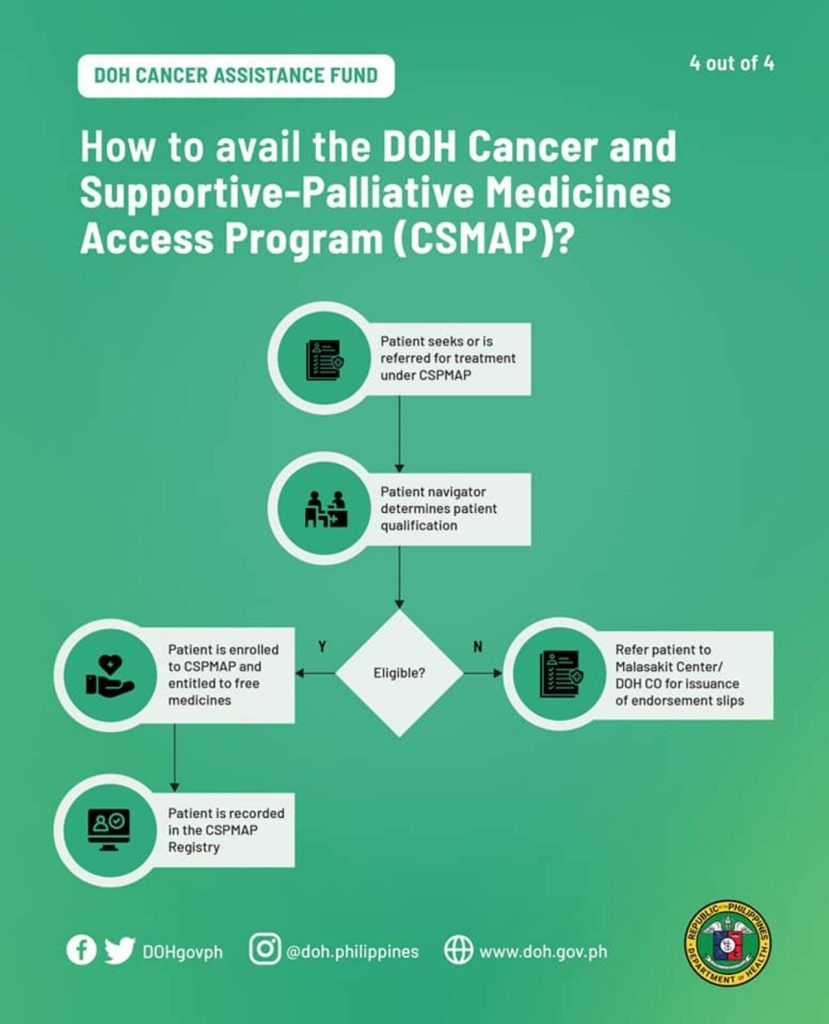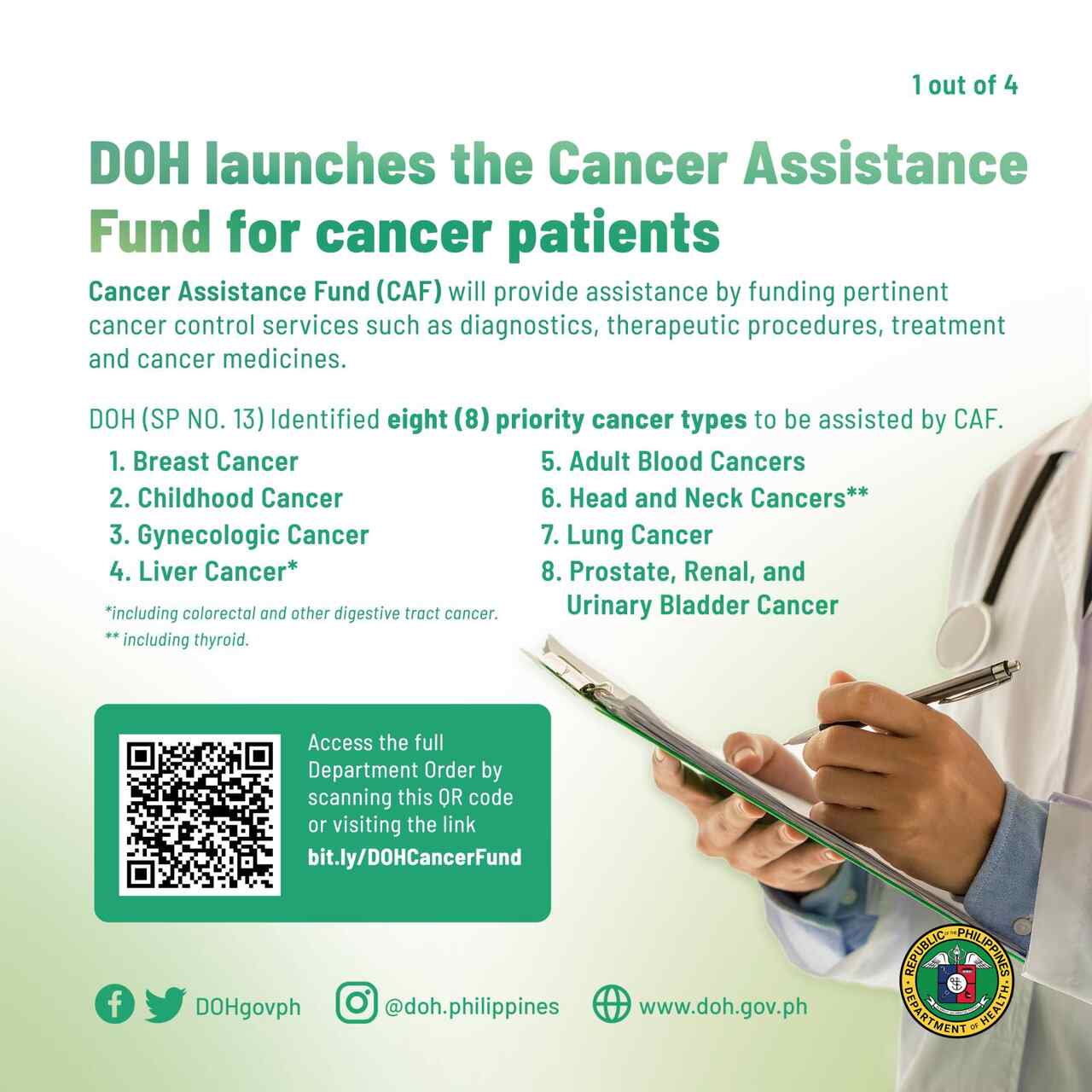The DOH Cancer Support and Palliative Medicine Access Program (CSPMAP)—also known as Ayuda sa Kanser or Ayus Ka—is a national initiative by the Department of Health (DOH) designed to provide free cancer medicines to qualified patients. It supports those undergoing treatment for various types of cancer, with particular attention to cancers with high mortality rates such as breast cancer, pediatric cancers, lung cancer, and more.
First launched in 2011 as the Cancer Medicines Access Program (CMAP), CSPMAP has since evolved under Republic Act 11215 or the National Integrated Cancer Control Act (NICCA). Through this program, patients are able to access free chemotherapy and palliative medicines via DOH-accredited public hospitals.
Program Overview
The DOH CSPMAP provides free, DOH-funded cancer and supportive-palliative medicines to eligible patients receiving treatment at accredited public hospitals across the Philippines. The program operates through a network of 24 DOH-accredited access sites, where patient navigators and CSPMAP coordinators manage enrollment, medicine distribution, and treatment monitoring.

Features
Some of the key features offered by this program include:
- Free chemotherapy and palliative medicines for eligible cancer types
- 24 DOH-accredited public hospital access sites nationwide
- No out-of-pocket payments required for enrolled patients
- Focus on high-incidence and high-mortality cancers (e.g., breast, lung, pediatric, gynecologic)
- Mandatory use of FDA-approved drugs listed in the Philippine National Formulary (PNF)
- Services guided by Republic Act No. 11215 (National Integrated Cancer Control Act)
- Assigned patient navigators assist in enrollment, medicine tracking, and treatment guidance
- Monthly and annual reporting system for program monitoring and accountability
- Access to supportive and palliative care alongside chemotherapy treatment
- Coordination with PhilHealth and other funding sources for broader coverage
- Transfer system for medicines to avoid expiration and supply issues across access sites
- Participation in national cancer awareness campaigns and community education drives
Funding and Legal Basis
It is supported by the Cancer Assistance Fund (CAF), sourced from:
- General Appropriations Act (GAA)
- Local and foreign donations
- Fundraisers managed by the DOH and partner organizations
The program operates under the Republic Act 11215 (NICCA) and complements the Universal Health Care Act (RA 11223).
Who Can Avail of CSPMAP?
The program is open to all cancer patients, regardless of income level. However, patients must begin treatment at one of the 24 DOH-accredited hospitals to access free chemotherapy drugs. These hospitals serve as official CSPMAP access sites.
Priority Cancer Types Covered:
- Breast cancer (Stage 0 to 3B)
- Pediatric cancers
- Gynecologic cancers
- Digestive tract cancers (e.g., colorectal, liver)
- Adult blood cancers
- Lung cancer
- Head, neck, and thyroid cancers
- Urinary tract cancers (e.g., prostate, renal, bladder)
If any of these cancer types are later covered by PhilHealth, they may be removed from the CSPMAP list and replaced by other high-need types.
List of DOH-Accredited CSPMAP Hospitals
Patients must seek treatment only from these 24 CSPMAP-accredited facilities:
National Capital Region (NCR):
- UP-Philippine General Hospital (PGH), Manila
- East Avenue Medical Center, Quezon City
- Jose R. Reyes Memorial Medical Center, Manila
- Amang Rodriguez Memorial Medical Center, Marikina
- Rizal Medical Center, Pasig
- National Kidney and Transplant Institute, Quezon City
Luzon:
- Ilocos Training and Regional Medical Center, La Union
- Region 1 Medical Center, Pangasinan
- Mariano Marcos Memorial Hospital, Ilocos Norte
- Cagayan Valley Medical Center, Tuguegarao
- Jose B. Lingad Memorial Regional Hospital, Pampanga
- Bataan General Hospital, Bataan
- Batangas Medical Center, Batangas
- Bicol Medical Center, Camarines Sur
- Bicol Regional Training and Teaching Hospital, Albay
- Baguio General Hospital, Baguio City
Visayas:
- Corazon Locsin Montelibano Memorial Hospital, Bacolod
- Western Visayas Medical Center, Iloilo
- Vicente Sotto Memorial Medical Center, Cebu
Mindanao:
- Zamboanga City Medical Center
- Northern Mindanao Medical Center, Cagayan de Oro
- Davao Regional Medical Center, Tagum
- Southern Philippines Medical Center, Davao City
- Cotabato Regional and Medical Center
Step-by-Step Application Process
To apply, these are the steps that you need to follow:
Step 1. Seek Initial Diagnosis
After diagnosis of a priority cancer (such as breast cancer), proceed immediately to one of the 24 CSPMAP-accredited hospitals.
Step 2. Get a Referral
Request a referral from your surgeon or oncologist to join the Patient Navigation Program of the Philippine Cancer Society. This is a pre-screening step to determine your eligibility.
Step 3. Submit Required Documents
Prepare and submit the following:
- Medical abstract (from attending oncologist)
- Doctor’s order or valid prescription
- CSPMAP application forms (completed by you and your physician)
Step 4. Work With a Patient Navigator
Each access site assigns patient navigators to assist applicants. Patient navigators are licensed healthcare professionals who guide patients through their treatment journey. Their tasks include:
- Enrolling patients into the CSPMAP Registry
- Communicating with patients and other access sites
- Monitoring medicine inventory and demand
- Helping families locate medicines not currently in stock at their site
- Ensuring accurate and timely reporting to the DOH
Note: In high-volume sites, they may be assisted by health worker aides to improve service efficiency.
The DOH hospitals accredited under CSPMAP, on the other hand, are expected to:
- Assign at least two patient navigators to handle enrollment, treatment tracking, and logistics.
- Appoint a CSPMAP Coordinator, typically a medical or pediatric oncologist, to oversee compliance and reporting. The coordinator is expected to:
- Supervise the proper handling, storage, and administration of medicines
- Ensure multidisciplinary patient care by coordinating with medical teams
- Provide feedback on medicine use, budget impact, and effectiveness
- Recommend additional medicines for CSPMAP inclusion if needed
- Avoid overstocking medicines and transfer slow-moving drugs to other sites when needed.
- Submit monthly and annual utilization reports to the DOH.
- Host awareness campaigns in line with DOH Cancer Awareness Month events.
Step 5. Get Endorsement Slip
If you meet the eligibility requirements, your navigator will request an endorsement slip from the DOH or Malasakit Center.
Step 6. Start Treatment
Once enrolled, you are entitled to free medicines and supportive care throughout your treatment. All CSPMAP medicines are FDA-approved and part of the Philippine National Formulary.
Monitoring and Reporting
To keep the program efficient, DOH requires access sites to:
- Submit monthly utilization reports (1st Friday of each month)
- Submit annual utilization reports (2nd Friday of January)
- Coordinate logistics closely with the DOH and other access sites
- Report any adverse drug reactions (ADRs) to both the hospital’s internal committee and the FDA
Important Reminders for Patients
Here are some reminders for patients interested in applying for the CSPMAP:
- Only patients treated at accredited CSPMAP hospitals can receive free medicines.
- No payments should be collected from CSPMAP enrollees. Supplies and drugs are covered by DOH and PhilHealth.
- Always consult your patient navigator before transferring hospitals or requesting additional medicines.
- CSPMAP also covers supportive and palliative care, not just chemotherapy.
Video: DOH Updates on Cancer Control and NICCA
The DOH Cancer Support and Palliative Medicine Access Program (CSPMAP) helps thousands of Filipinos manage cancer without the burden of out-of-pocket expenses. If you or your loved one has been diagnosed with a covered cancer type, go immediately to one of the accredited hospitals and begin the application process. Through proper coordination with patient navigators and oncologists, CSPMAP offers continued access to life-saving and supportive cancer treatments at no cost. Learn more about the government’s efforts regarding cancer control by watching this video:
For more details, visit the official DOH website at www.doh.gov.ph or contact your nearest DOH-accredited hospital.
